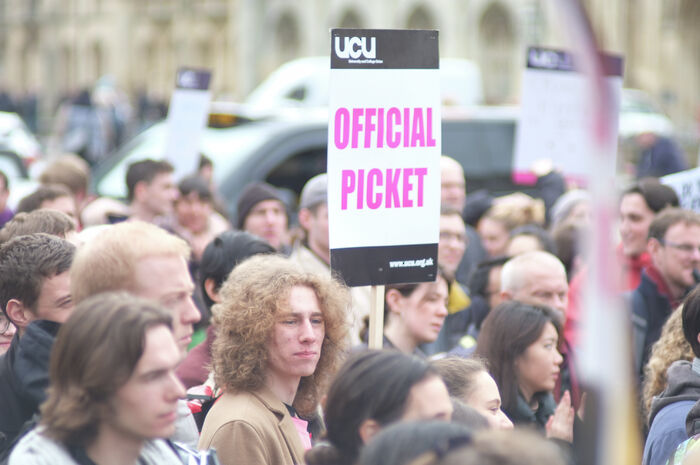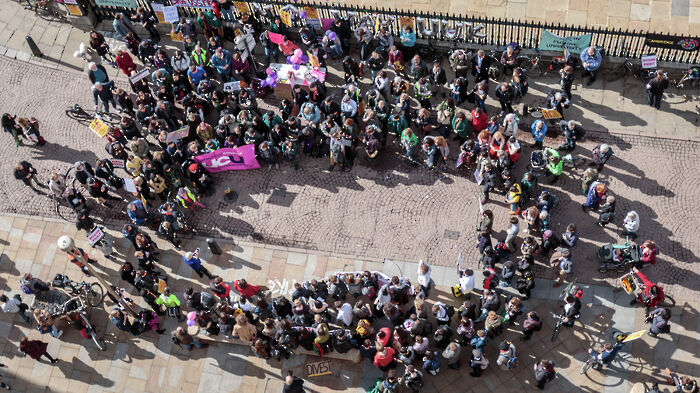UCU ballot opens on possibility of further strikes by university staff
The results of the ballot will determine whether staff in Cambridge and across the country will go forward with industrial action over pay, casualisation, and workload

The Universities and College Union (UCU), the largest trade union in the UK for staff employed by higher education institutions, has today launched its ballot for members to vote on whether they will take to the picket lines later in the academic year.
The ballot, which will close in mid-October, marks one year on from when the vote on changes to staffs’ pensions provided a mandate for the largest-scale higher education industrial action in recent memory. In Cambridge more than 1,000 staff participated in the recent strike action.
The current ballot centres around four key issues in the higher education sector: low pay, excessive workloads, the gender pay gap, and employment casualisation – the practice of placing academic staff on zero hours, or short, fixed-term contracts.
Earlier this year, 65% of voting UCU members indicated that they would be willing to strike over these issues, which were brought to the fore during the recent pensions strikes, as staff protested what they viewed as an increasingly marketised higher education system.
The ballot opening today will provide a more binding result: if a majority of UCU members vote in favour of strike action, the trade union will likely call for it. Possible dates and duration of any industrial action have yet to be announced, though it may affect up to 147 institutions across the UK.
Cambridge UCU branch secretary Dr Waseem Yaqoob indicated that “in the initial, online consultation, [the Cambridge UCU] branch saw more than 90% vote to reject the employers’ offer and 76% say yes to industrial action, on a turnout well above 50%.”
The ballot is formally a vote on whether to accept the pay rise offered by the Universities and Colleges Employers Association (UCEA): an increase of between 2-2.8% for staff in higher points along the pay spine and £425 for staff with lower salaries. UCEA has said that the offer “more than matches the current level of inflation”, while the UCU has rejected their calculations and has called for a 7.5%, or £1,500 pay increase. They argue that the value of pay in the higher education sector “has declined in real terms by nearly 18% since 2009.”
A Cambridge University spokesperson said that “the University recognises the concerns of union members and other staff about pay”, and “remains committed to a higher uplift in basic pay than the 2 percent if the national pay offer changes.”
The vote also cites the sector’s gender pay gap – in Cambridge, the average gender pay gap was calculated at nearly 20% earlier this year, as opposed to the average gap of 12% across the sector. Cambridge sees further pay disparities across its schools – as well as excessive workload and employment casualisation as points of concern.
A Cambridge UCU 2016 survey found that Cambridge staff work “an average 52.8 hours a week”, while many have additional collegiate responsibilities.
Speaking to Varsity, Yaqoob expressed optimism that the branch would be able to mobilise staff numbers in the case of industrial action, as he claimed, “staff are more confident now and less willing to allow their pay and conditions to deteriorate”. He added that following the strikes over pensions, many members “realise that [strike action] may be the only way of making management listen to our concerns about the direction that universities are taking.”
The strikes in Lent Term – which staff had said posed a difficult dilemma between disadvantaging students’ education and protesting to protect their future pension values – resulted in several concessions by the advocating organisation for employers, including the creation of a Joint Expert Panel to reevaluate the valuation of the pension scheme for university staff on which the changes were based.
Speaking on the potential impact of the strikes on students, Yaqoob argued: “Our working conditions are students' learning conditions. Marketisation means that universities are charging students exorbitant £9,000 fees, but underpaying the staff who teach and support them.”
Yaqoob said that the Cambridge UCU branch is aware that “strikes are disruptive for education,” and so it does not “take the decision to strike lightly”. He added that “during the pension strikes in Lent students showed staff heartwarming levels of solidarity, visiting our picket lines and pressuring the university to bring the dispute to an end.”
The strikes saw substantial support from student activists, culminating in a five-day occupation of Old Schools, the University’s central administrative building. Cambridge Defend Education (CDE) urged UCU members earlier this week to vote in favour of strike action, saying: “we are prepared to support staff in their campaign against precarity and inequality in the higher education sector”.
As the ballot opens, several NUS representatives – including former CUSU Women’s Officers Lola Olufemi and Amelia Horgan – have put their names to a motion submitted to the National Union of Students’ National Executive Council, calling on the NEC to resolve to support academic staff in their “pay struggles across the education sector”, and to produce “information and training on how to support the strikes should they go ahead”.
 News / Cambridge study finds students learn better with notes than AI13 December 2025
News / Cambridge study finds students learn better with notes than AI13 December 2025 News / Cambridge Vet School gets lifeline year to stay accredited28 November 2025
News / Cambridge Vet School gets lifeline year to stay accredited28 November 2025 Science / Did your ex trip on King’s Parade? The science behind the ‘ick’12 December 2025
Science / Did your ex trip on King’s Parade? The science behind the ‘ick’12 December 2025 News / Uni Scout and Guide Club affirms trans inclusion 12 December 2025
News / Uni Scout and Guide Club affirms trans inclusion 12 December 2025 Arts / Modern Modernist Centenary: T. S. Eliot13 December 2025
Arts / Modern Modernist Centenary: T. S. Eliot13 December 2025










